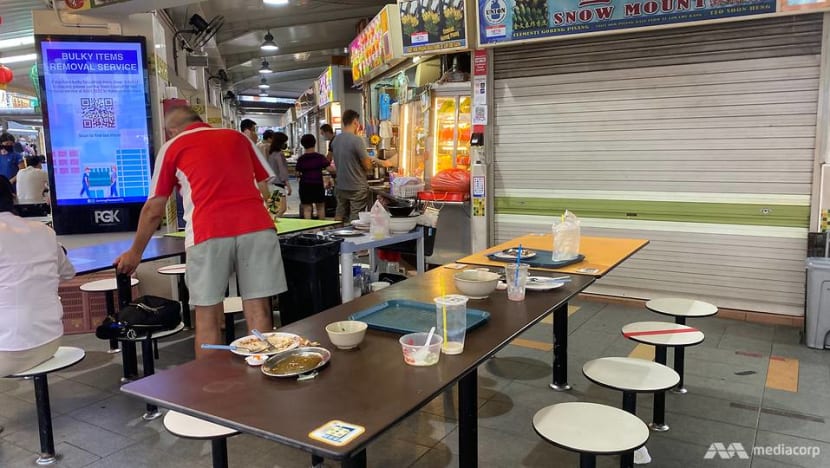Change in mindsets, establishing norms needed to get diners to return their trays, say experts

Trays and used utensils were left behind by diners when CNA visited Clementi Market and Food Centre on Feb 4, 2021. (Photo: Ang Hwee Min)
SINGAPORE: Beyond initiatives to nudge diners into returning their trays, an overall change in people's mindset is needed for such plans to work, said observers.
It was announced on Friday (Apr 16) that coffee shops and food courts will get funding to install tray return facilities.
Under the Clean Tables Support Scheme (CTSS), authorities will defray 50 per cent of the cost they incur for facilities such as racks and trolleys, capped at S$2,500 per premises.
The scheme also covers the purchase of trays, which are meant to make it more convenient for diners to return their crockery.
READ: Coffee shops, food courts to get funding support for tray return facilities
Sociologist Paulin Tay Straughan from the Singapore Management University said that the infrastructure may not be enough.
“Bad behaviour has entrenched. It’s not going to work that easily just because you have trays available, returning stations available,” said Professor Straughan, who conducts an annual survey on people's satisfaction with public cleanliness.
“When things have gone wrong, the only way to get it back right is to have policing of norms and expectations,” she added.
TRAY-RETURN AMBASSADORS?
Prof Straughan suggested that volunteers be deployed to urge people to return their trays, adding that they may be clearly identifiable as ambassadors through what they wear.
“I drew my inspiration from my red-shirted friends ... when they come now, people automatically put their masks on because they know that they (the ambassadors) have been given the mandate,” she said, referring to the COVID-19 safe distancing ambassadors.
She said this has to be done for “a sufficient period of time for the norms to sink in”, likening the situation to people learning the norm of queuing.
“It’s been so long that now, it’s been ingrained in us, the norms have been set and we now queue. We tell people off if they don’t queue. The reason we can do that is that the norms have been established,” she said.
Dr Mathew Mathews, principal research fellow at the Institute of Policy Studies who jointly conducts the survey, said it may be hard for people to internalise these norms as different things may be expected of them at different places.
For example, at some eateries, cleaners may be expected to be “enthusiastic” in clearing trays to ensure a quick turnover of diners, he said.
GREATER OWNERSHIP NEEDED
Chairman of the Public Hygiene Council Edward D’Silva said that while the funding support for tray return facilities is welcome, it is “not enough”.
“Greater ownership is needed as a more sustainable way forward to keep our public dining places clean and hygienic,” he said.
While some may feel that cleaning up after themselves by returning their trays will cause cleaners to lose their jobs, he said “this is simply not true”.
“In fact, we are helping them reduce their workload and making their jobs easier. They can then focus on the important cleaning jobs like disinfecting tables and distributing trays and crockery back to the stalls,” he said.
“If we appreciate our cleaners, it is not enough to just say thank you. We need to demonstrate through our actions by cleaning the tables after we have dined at these shared public places.”
Mr D’Silva added that the Government can also do more to get people to clear their trays.
“It can consider helping operators to improve the design of the tray return infrastructure in order to enhance visibility. These can be implemented once the operators have installed the tray return facilities with the grant,” he said.
WHY PEOPLE DON’T RETURN THEIR TRAYS
When CNA visited a food court at lunchtime on Monday, two diners said they did not return their trays as they could not see the tray return stations.
One of them was seated where the return station was not visible. Others said that the two return stations in the middle of more than 20 stalls were too far, or that it is not a habit for them to return their trays.
A 23-year-old man, who wanted to be known only as Soon, said he would clear the table if he saw that someone was waiting to use it immediately after him.
“Otherwise I would leave it to the cleaners,” he said.
At the time, there were four cleaners who were wheeling their cart around to clear the tables. While they managed to clear most tables quickly, at any one time, there were at least three tables that still had plates or trays on them.
Mr D’Silva said that leaving the tables clean after dining is the “first step” in a positive chain reaction.
“(There will be) less potential bacteria breeding, less leftover food and used crockery to attract pests and pigeons. It is also a kind and gracious behaviour,” he said.
Cleaning supervisor Gerald Pablea said that if people returned their trays, it would help the mostly elderly employees who work under him.
“It will be good because it will be less work (for the elderly workers). They can arrange chairs, clean the tables and sanitise the tables,” he said.














